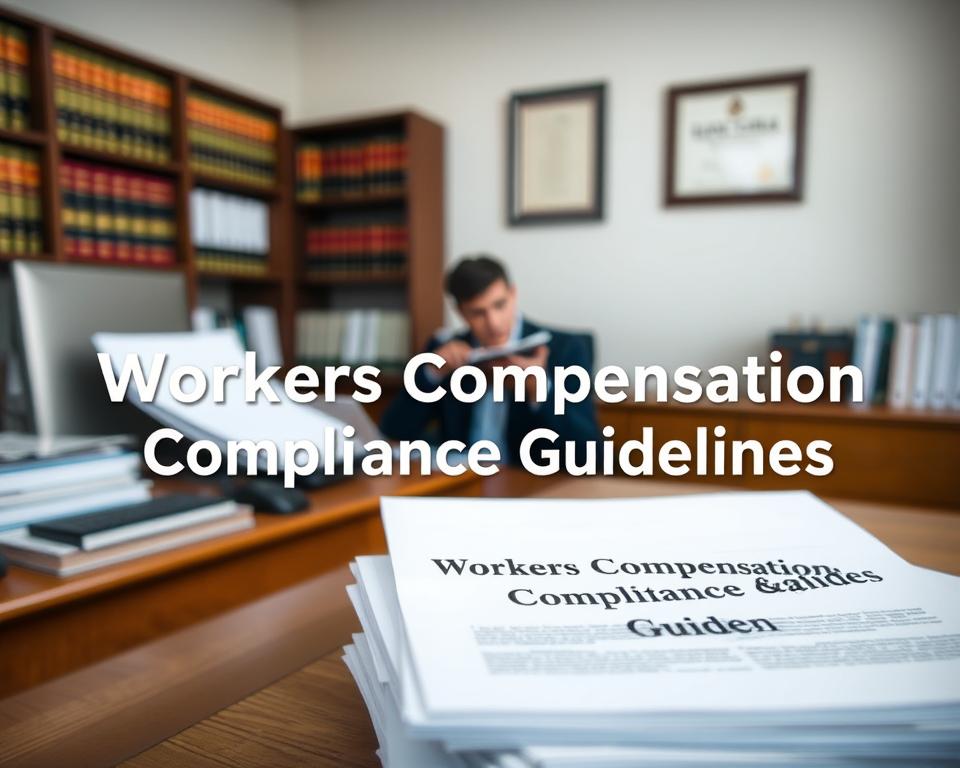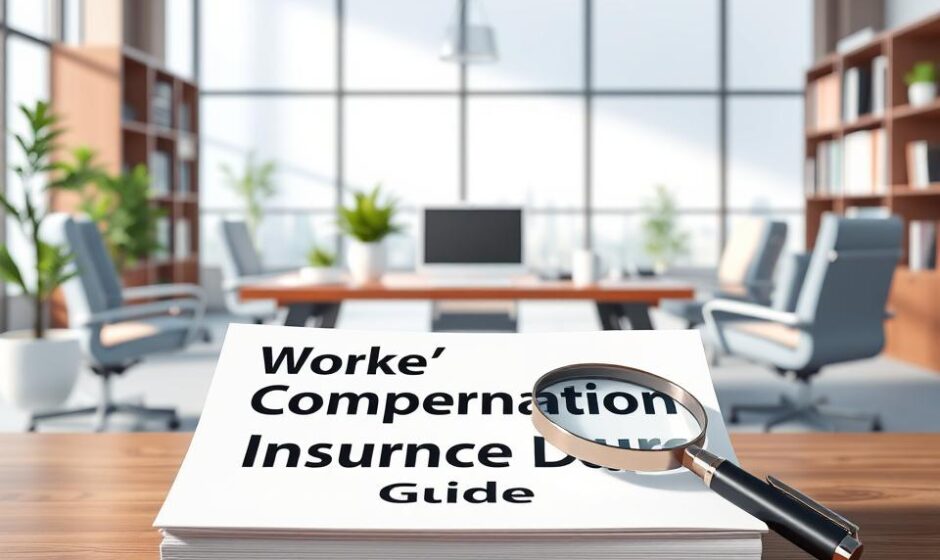Every year, 90% of U.S. employers face fines for not following workers’ compensation laws. This insurance is more than a legal must—it’s a safety net for businesses and workers in tough times. It protects companies from lawsuits and pays for medical care, lost wages, and funeral costs for injured workers. But, how do employers deal with its complex rules and costs?
Workers’ compensation is based on a no-fault system. This means workers get benefits no matter who was at fault. For businesses, this means avoiding expensive lawsuits. Almost every employer must have this insurance, except for some small businesses in Texas. Not having it can lead to big fines: California can fine up to $100,000, and Illinois charges $500 a day.
The cost of workers’ compensation varies a lot. It depends on the industry, how much you pay your workers, and the laws in your state. For example, construction jobs cost more than office jobs. But, by improving safety, you can lower your costs. Employers can also save money by raising deductibles or getting credits for preventing injuries. Using tools like Homebase’s automated reporting can make following the rules easier. And, combining this insurance with health plans can help save even more money.
Key Takeaways
- Workers’ compensation is mandatory in 49 states, excluding Texas, with strict penalties for non-compliance.
- Premiums depend on industry risk, payroll size, and a company’s claims history.
- Safety programs and low claims history can slash premiums through credits and modified rates.
- Coverage includes medical costs, lost wages, and death benefits, protecting both employees and employers.
- Homebase’s tools help manage classification, reporting, and compliance efficiently.
Understanding Workers’ Compensation Insurance Basics
Workers’ compensation insurance is key for businesses. It makes sure employees get medical help and pay if they get hurt or sick at work. It also protects employers from lawsuits if accidents happen. Let’s explore how it works.

What Is Workers’ Compensation Insurance?
Workers’ compensation is a no-fault system. It means employees get benefits like medical costs and pay without needing to prove fault. For example, if a construction worker breaks their arm, they get care without needing to blame the employer. In return, workers can’t sue their employer for pain and suffering. Important points include:
- Covers medical care and wage replacement
- Excludes injuries from intoxication or intentional harm
- Employers must report severe injuries to OSHA within 8 hours
Historical Development of Workers’ Compensation in the US
| Year | Event |
|---|---|
| 1911 | Washington state passes first US workers’ compensation law |
| 1937 | Expansions added permanent disability and survivor benefits |
| 1971 | Reforms required coverage for more industries and workers |
How Workers’ Compensation Protects Both Parties
For employees: They get guaranteed benefits like medical care and pay. For employers: They get legal protection from lawsuits and can manage costs better. This balance helps avoid disputes and focuses on healing, not blame. All 50 states require this coverage, with some rules varying.
Legal Requirements for Workers’ Compensation Across States
Workers compensation laws change a lot from state to state. This means businesses must adjust their compensation insurance policy to fit local rules. Not following these rules can lead to fines, lawsuits, and even stop your business from working. Here’s what you need to know.

State-by-State Compliance Guidelines
Here are some key things to remember:
- New Jersey says all employers must have coverage, except those who self-insure. Businesses from other states working in NJ also need to follow this rule.
- Alabama requires coverage for businesses with five or more employees. This doesn’t include farm workers or people working in homes.
- Texas lets employers choose not to have workers compensation. But, they must tell their workers in writing. Companies that aren’t in construction and have four or more workers must have coverage.
- Florida says out-of-state employers must tell their insurance company or get a policy made for the state.
- Contractors need to check if their subcontractors have coverage to avoid being responsible for their injuries.
Penalties for Non-Compliance
States have strict rules for those who don’t follow the law:
- New Jersey: You could face up to $1,000 a day in fines and even criminal charges if you ignore the rules on purpose.
- Alabama: You’ll get fined $1,000 a day for each employee you don’t cover.
- Alaska: You could get fined up to $10,000 and even go to jail if you break the rules.
Exemptions and Special Cases
Some businesses don’t have to follow the rules:
- In some states, farm owners don’t have to cover their workers if they have fewer than six regular farm workers.
- Some states don’t count independent contractors or people who own their own business as employees.
- Small businesses with fewer than four employees in certain areas might not need coverage.
Make sure you know your state’s rules to avoid any gaps in coverage. Even small businesses need to check their state’s rules to stay legal.
What Your Compensation Insurance Policy Covers
Your compensation insurance policy protects both employees and employers. It covers important aspects of work-related issues. Let’s explore what it includes:
- Medical expenses: The policy pays for all medical needs, from emergency visits to surgeries and prescriptions.
- Wage replacement:
- It offers 60-75% of an employee’s usual income while they recover.
- Permanent disability payments:
- It provides compensation for lasting injuries that limit work ability.
- Death benefits:
- It covers funeral costs and financial support for dependents in fatal cases.

Employers also get legal protection. The policy handles claims and provides legal help. It also protects against most lawsuits from work-related injuries or illnesses.
It covers repetitive stress injuries and illnesses caused by work conditions. This ensures fair support for long-term health issues. Employers should check their policy for coverage limits and what’s not included.
Types of Workplace Injuries and Illnesses Covered
Workers compensation policies protect both employees and employers. They cover a wide range of injuries and illnesses. Knowing these categories helps businesses ensure they have the right compensation insurance coverage. Let’s look at what’s included:

| Type | Examples |
|---|---|
| Immediate | Falls, burns, machinery accidents |
| Cumulative | Carpal tunnel, tendonitis, chronic back pain |
Common Covered Injuries
- Physical Injuries: Sprains, fractures, cuts, and burns from accidents
- Occupational Diseases: Respiratory illnesses from toxins, hearing loss, or skin conditions
- Mental Health: PTSD, anxiety, or depression linked to work trauma (varies by state)
- Travel Incidents: Injuries during business trips, client visits, or work-related events
In 2018, over 2.8 million workplace injuries happened. This includes the “fatal four”: falls, electrocutions, struck-by incidents, and caught-in/compression injuries. These numbers show why clear workers compensation policies are key. For example, repetitive strain injuries like carpal tunnel syndrome qualify even without a single accident. Employers must also address mental health claims, which 35 states now partially cover after traumatic events.
Review your policy details to align with state rules. Stay informed to protect workers while avoiding costly legal risks.
Benefits of Compensation Insurance for Your Business
Workers compensation insurance does more than meet legal standards—it delivers tangible advantages that keep businesses thriving. By providing benefits of compensation insurance, this coverage makes workplaces safer and more resilient. It also strengthens the bond between employers and employees.

- Legal Protection: The no-fault system shields employers from most injury-related lawsuits, eliminating unpredictable legal costs.
- Financial Stability: Covers medical bills, rehabilitation, and lost wages, preventing financial strain from workplace incidents.
- Employee Retention: Demonstrated care for worker wellbeing boosts loyalty, reducing turnover and improving productivity.
Partnerships like the Chamber’s collaboration with Accident Fund Group offer workers compensation savings. They provide 5% upfront discounts and dividend opportunities for low-claim businesses. Employer liability coverage further protects against rare lawsuits, while safety-focused policies reward proactive risk management.
These protections not only fulfill legal requirements but also create a culture of safety and trust. By prioritizing these benefits of compensation insurance, businesses can focus on growth. They can safeguard their workforce and bottom line.
Compensation Insurance Coverage Limitations and Exclusions

Compensation insurance has its limits. Not every workplace injury gets covered. It’s important to know what your policy includes and excludes. Here are some common exclusions:
- Injuries from intoxication or illegal drug use are not covered.
- Self-inflicted injuries, including mental health-related self-harm, are excluded.
- Pre-existing conditions are only covered if worsened by work activities.
- Independent contractors and family members in farming roles typically lack coverage.
- Injuries from horseplay, fights, or personal activities at work are excluded.
- Commute-related injuries are not covered under the “coming and going” rule.
- Heart attacks or strokes are excluded unless directly linked to a work injury.
“The policy includes Employers Liability protection for injuries not covered under Wisconsin’s Workers’ Compensation Act.”
Your compensation insurance policy has its own rules. For example, injuries to sole proprietors or LLC members are often not covered. Always check the policy wording for state-specific rules, like the nine-part test for independent contractors.
Compensation insurance policies can differ. Misclassifying employees can lead to legal trouble. Talk to an insurance expert to understand your policy. Regularly check your coverage to fill any gaps and stay in compliance.
Factors Affecting Compensation Insurance Cost
Business owners often wonder why their compensation insurance cost varies. Understanding these factors helps reduce premiums while ensuring compliance. Let’s break down the key elements influencing your policy.

| Industry | Risk Level |
|---|---|
| Construction | High |
| Healthcare | Moderate |
| Office Work | Low |
Industry Classification and Risk Levels
Businesses are grouped by compensation insurance industry codes. High-risk industries like construction face higher premiums. Low-risk roles, such as office jobs, see lower costs.
Payroll Size and Employee Count
Premiums often rise with payroll totals. Larger teams mean higher coverage costs due to more employees at risk.
Claims History and Experience Modification
Carriers review past claims via an Experience Modification Rate (EMR). A history of frequent injuries can increase rates. Safe workplaces with few claims may qualify for discounts.
State-Specific Rating Factors
State laws set minimum coverage levels and base rates. For example, Texas and California have distinct rules affecting premiums.
By addressing controllable factors like safety programs, employers can lower costs. Compare quotes from multiple carriers to find the best compensation insurance options.
How to Find the Best Compensation Insurance Company
Finding the right compensation insurance provider is key. Look at their reputation, service, and how well they know their stuff. First, check if they have strong financial ratings from places like AM Best or the BBB. This makes sure they can handle claims for a long time.

- Financial Strength: Find carriers with A+ ratings, like Liberty Mutual’s A++ or Chubb’s A+.
- Industry Focus: Choose ones that fit your business, like Nationwide for construction or The Hartford for retail.
- Customer Support: Look for 24/7 claims help and programs to get workers back to work fast.
| Provider | Specialty | Key Features |
|---|---|---|
| Hiscox | All industries | Bundled coverage options, BBB-accredited |
| EMC | Small businesses | Return-to work programs, loss control tools |
| Chubb | High-risk industries | Medical provider networks, nurse case managers |
Ask about their safety resources, like AmTrust’s free training. Also, compare how flexible their premiums are. Don’t just see workers’ comp as any product. Pick a partner that really gets your business’s risks and recovery needs.
Steps to Buy Compensation Insurance Online
Buying compensation insurance online is easy. Just follow these steps to find the best compensation insurance provider and get coverage fast:
- Prepare your documents: Collect your payroll records, employee types, and past insurance details. Make sure you have your FEIN, 1099 forms, and NYS-45-MN/941 tax filings.
- Compare providers: Look up carriers like The Hartford, which offers online quotes in most states. Check for features like nurse case managers and 24/7 support.
- Answer application questions: Fill out the online form in 10 minutes. Share details about your business and any past claims.
- Review and finalize: Double-check coverage limits, deductibles, and what’s not covered. Make sure the buy compensation insurance online site is licensed in your state.
- Submit and pay: Sign digitally and pay for it. Most policies start the next day at 12:01 a.m. EST after approval.
Need more help? If your business is risky or has complex needs, think about working with an agent. Agents can help with endorsements and special programs.

“Choose a provider with a strong claims process and safety resources to protect your business and employees.”
Remember, some policies take 10-14 days to process. Always check that your documents meet your state’s needs. Applications are available in Spanish for those who speak it.
Implementing a Workplace Safety Program to Reduce Premiums
To lower your compensation insurance cost, start by preventing injuries. A strong safety program protects workers and cuts down on claims. This can save you up to 40% on compensation insurance costs over time.
Safety isn’t just about compliance—it’s a strategic move to safeguard your workforce and budget.
First, do a risk assessment. Use job hazard analyses and regular checks to find hazards before they cause problems. Keep track of near-misses and injuries to find areas that need work.
Risk Assessment Techniques
- Do monthly checks to find hazards like slippery floors or broken equipment.
- Use checklists for risky tasks like lifting or using machines.
- Look at past incidents to find patterns and fix the problems.
Employee Training Best Practices
Training helps workers stay safe. New employees should get a safety briefing. Keep training going to keep skills up. Use role-playing and hands-on training to make lessons memorable.
Documentation and Reporting Protocols
Keep a record of every incident, no matter how small. Use digital logs for near-misses and to report trends to insurers. Good records help manage risks and lower your compensation insurance cost.
| Strategy | Annual Savings |
|---|---|
| Regular Safety Training | Up to 40% less claims |
| Risk Mitigation Programs | Lower EMR over 4 years |
| Return-to Work Programs | 25% less claim time |
Use incentives to get safety teams involved. Small rewards for reporting hazards or finishing trainings can help. Every dollar spent on safety can save $4 in claims, OSHA says. Start with small steps, like monthly meetings, and grow the program as you see results.
Handling Workers’ Compensation Claims Effectively
Managing workers compensation claims is key to protecting your business and helping injured employees. Start by staying calm and following your compensation insurance policy guidelines. Here’s how to proceed:
- Act Fast: Tell your insurance provider right away. Most states need you to report injuries within 24–72 hours to avoid penalties.
- Document Everything: Get medical reports, accident photos, and witness statements. This helps build a strong claim file.
- Coordinate with Experts: Your agent will send the claim to your carrier. They make sure everything matches your policy.
- Stay Connected: Keep in touch with the adjuster and the employee. Use tools like Broadspire’s analytics to track progress.
A smooth return-to work benefits everyone. Think about light-duty roles or modified schedules. This helps employees recover while keeping costs down. Here are key actions to focus on:
| Step | Action | Why It Matters |
|---|---|---|
| 1 | File injury reports promptly | Avoid penalties and delays |
| 2 | Share medical updates | Ensure accurate claim processing |
| 3 | Plan return-to work | Boost employee morale and reduce costs |
If disputes come up, talk to your carrier or legal team. The Division of Workers’ Compensation (DWC) can help solve problems. Always keep records of decisions and follow state rules to stay compliant.
Conclusion: Protecting Your Business and Employees with the Right Coverage
Workers compensation insurance is more than a legal must—it’s key to a business’s strength. Every year, over 3 million workplace injuries happen, showing why coverage is essential. It protects both workers and employers.
Choosing the right insurance policy helps avoid big fines, lawsuits, and work stoppages. Safety records affect premiums. So, regular training and checking equipment are important.
Overexertion is the main cause of injuries, making ergonomic practices and breaks very important.
Smart employers invest in safety to lower costs and build trust. A good policy covers medical and lost wages. It also helps reduce claim costs, which can be very high.
Working with providers that offer safety services can also reduce risks. Regular checks on coverage and workplace rules keep businesses up to date. This includes handling mental health claims and remote work dangers.
Protecting employees is not just right—it’s wise for business. With workers compensation, companies save a lot of money and create a safer work environment. Start by reviewing your policy, training staff, and teaming up with reliable insurers. This way, your business will stay safe and strong.



